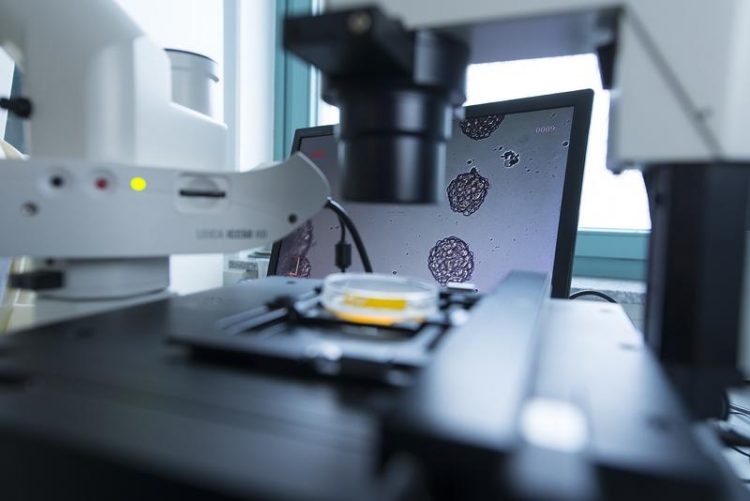Scientists discover new mechanisms of early metastatic spread in breast cancer

For their studies, the researchers culture primary mammary gland cells. This results in the formation of so-called spheres, which enable experimental investigation of metastasis. Photo: Ralf Mohr; Fraunhofer ITEM
Over decades, cancer research pursued the dogma that cancer cells seed mainly from advanced tumors – based on the finding that early diagnosis and surgical removal are decisive for curing cancer patients. Recently, however, the validity of this concept in explaining treatment success has been questioned increasingly, because patients with small tumors also develop metastases.
Furthermore, the genetic profile of disseminated cancer cells often does not show the expected similarity to the primary tumor. Derivation of disseminated cancer cells, as precursors of metastases, frequently seems to occur at early tumor evolution stages already.
Researcher teams under Prof. Christoph Klein (Regensburg) and Prof. Julio Aguirre-Ghiso (New York) for the first time ever studied mechanisms of early metastatic spread in breast cancer. They found that breast cancer formation hijacks physiological processes controlling mammary epithelial branching and expansion during adolescence and pregnancy, deregulates and uses them for tumor cell dissemination.
Once disseminated, these cells settle in other tissues and, after further genetic alterations, can grow to often life-threatening metastases in the target organ. The two research teams initially worked independently, but then collaborated and published their results simultaneously in Nature. “Our fundamentally new findings will hopefully advance cancer research substantially,” Klein explains.
The researchers hope that the proposed mechanism will provide a general framework for understanding metastasis formation. According to their findings, cancer cells first go through an early dissemination stage at low cell density at the primary site and later on switch to a proliferation stage when high cell density is reached.
However, the Regensburg scientists also found that tumor cells can “relearn” to disseminate even at later stages – from areas of low cell density. This is probably why metastases may derive from different stages of primary tumor evolution, both early and late. Since these stages comprise genetically different cells and modern therapeutic approaches often target genetic alterations, therapies targeting the seed of metastasis need to address this heterogeneity of cells to be successful.
Contact
Fraunhofer ITEM
Prof. Dr. Christoph Klein; +49-941-944-6720
christoph.klein@klinik.uni-regensburg.de
Press contact
Dr. Cathrin Nastevska; +49-511-5350-225
cathrin.nastevska@item.fraunhofer.de
http://www.item.fraunhofer.de/en/services_expertise/tumor_therapy.html
http://www.item.fraunhofer.de/en/press-and-media/press-releases/PM_Nature_Papers…
Media Contact
All latest news from the category: Life Sciences and Chemistry
Articles and reports from the Life Sciences and chemistry area deal with applied and basic research into modern biology, chemistry and human medicine.
Valuable information can be found on a range of life sciences fields including bacteriology, biochemistry, bionics, bioinformatics, biophysics, biotechnology, genetics, geobotany, human biology, marine biology, microbiology, molecular biology, cellular biology, zoology, bioinorganic chemistry, microchemistry and environmental chemistry.
Newest articles

After 25 years, researchers uncover genetic cause of rare neurological disease
Some families call it a trial of faith. Others just call it a curse. The progressive neurological disease known as spinocerebellar ataxia 4 (SCA4) is a rare condition, but its…

Lower dose of mpox vaccine is safe
… and generates six-week antibody response equivalent to standard regimen. Study highlights need for defined markers of mpox immunity to inform public health use. A dose-sparing intradermal mpox vaccination regimen…

Efficient, sustainable and cost-effective hybrid energy storage system for modern power grids
EU project HyFlow: Over three years of research, the consortium of the EU project HyFlow has successfully developed a highly efficient, sustainable, and cost-effective hybrid energy storage system (HESS) that…





















